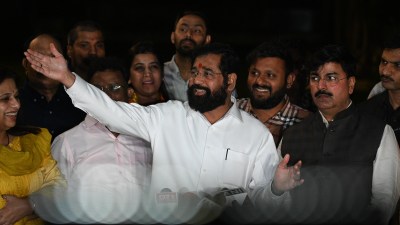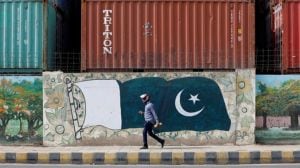Innocence lost
On a rickety porch, in the middle of the day in one of the world8217;s most devastated war zones, a fight over the ownership of a red bicyc...

On a rickety porch, in the middle of the day in one of the world8217;s most devastated war zones, a fight over the ownership of a red bicycle exploded between two boys. The childhood argument was as familiar as any on Earth. Except that one child 8212; a hard-looking boy who said his fighting name is Dog Eats Man and wouldn8217;t give his age 8212; had a gun and was waving it. 8216;8216;You stole my bike!8217;8217; cried Kuty Hinmie, 15, as his bony chest and shoulders shook. Thick tears tumbled from his almond-shaped brown eyes.
Dog Eats Man is a member of a rebel group that fought government troops and another rebel force for control of Liberia. All sides have armies that look like they are from a junior high school yearbook. Dog Eats Man grabbed the bike. He whacked Kuty8217;s head with his AK-47 and aimed the weapon at Kuty8217;s left foot.
Whether Dog Eats Man and the tens of thousands of other child soldiers can be disarmed is at the heart of the agreement aimed at ending 14 years of bloodshed in Liberia. The pact calls for rebel fighters and government soldiers to lay down their weapons and form a new national army. But more than half the combatants are estimated to be 15 or younger. They have grown up in a Liberia where it is easier to get an AK-47 than any kind of book or notepad.
With almost no opportunity for education or jobs, the task of getting any of the fighters, particularly the young ones, to put down their weapons and go on to another kind of life will be extremely difficult. Scenes from a day spent in this town, an hour8217;s drive west of the capital, Monrovia, and the headquarters of the rebel group Liberians United for Reconciliation and Democracy or LURD, showed just how complicated disarming fighters and rebuilding Liberia will be.
In Kuty8217;s confrontation with the rebel boy, a neighbour, Fatu Karmra, stepped in. She was furious that her porch was now the front line in a battle over a bike. 8216;8216;Listen to me!8217;8217; she shouted. Dog Eats Man threw down the gun, but the argument dragged on and moved off the porch as Kuty carried the bike on his shoulders and walked down the street. Dog Eats Man lurked behind him. Karmra noticed. She screamed: 8216;8216;Someone listen to me!8217;8217; Her voice only added to the thick chaos that swallowed this street. Boys with guns were piled onto pickup trucks that screeched through the centre of town. Gunfire went off every now and then. People shrugged and said it was just children playing.
When LURD8217;s chief of staff, Seyeh Sheriff, rolls through town in his sleek four-wheel-drive with license plate that reads 8216;8216;C.O.S. LURD,8217;8217; ordinary Liberians scramble away. But inside the rebel headquarters, Sheriff, who has given himself the rank of major general, said he is happy that Charles Taylor, who wielded power through the gun, has fled the country.
He said he was in Liberia8217;s special security service during the 1980s. He spoke of democracy, freedom and having the international community help his country.
Until, that is, he was asked about his enemy and how he fights most of his battles. 8216;8216;I see you. You see me. I kill you. No problems,8217;8217; said Sheriff. When he was asked why his rebel soldiers were still demanding money and terrorising civilians, he explained, 8216;8216;I arrest you and kill you.8217;8217; A key to regaining order on the streets is in this man8217;s hands. His child soldiers will give up their guns only when he says so. And he said he8217;s not ready yet.
At a rebel checkpoint, a boy named Lassana Kromah was wearing a girl8217;s braided wig, along with two bead necklaces. His gun hung over his back. His dress allowed him to shake bullets off his body, he explained. 8216;8216;I look fine,8217;8217; bragged Lassana, who looked about 15 but refused to give his age. 8216;8216;Let8217;s make business,8217;8217; he said as he asked for a bribe of food or cash from a group of women and men that passed by. Then he pulled a timid-looking girl to his side. He threw his arm around her waist. 8216;8216;Take my picture,8217;8217; he yelled to a journalist.
Standing nearby was his friend Ishmael Swaray, also known as Bad Pay Bad because 8216;8216;when Taylor did bad to us, we do bad to him.8217;8217; Bad Pay Bad has been fighting most of his life. He fought for LURD, and said he8217;s now willing to go back to school or go back to fighting. 8216;8216;Either one, cause I shake bullets. They pass over me. They can8217;t touch me,8217;8217; he sang out.
In some tribes in Liberia, fighters wear wedding gowns and other kinds of women8217;s dresses. They also sport choir and graduation gowns. They wear wigs and hold stuffed animals. Some clutch good-luck charms in the form of shells made into a necklace or wear talismans on their necks and carry boiled eggs. They believe each ornament makes them invisible and immune to their attackers. But in their minds, it also does something more important: It separates them from the crimes they commit, which is part of the reason fighters take what they call 8216;8216;jungle names.8217;8217; 8216;8216;It8217;s like magic,8217;8217; Bad Pay Bad explained. 8216;8216;I killed people and it doesn8217;t stick to me. I still go to heaven.8217;8217;
The UNICEF is working on a programme to disarm children based in part on a successful model used in Sierra Leone. In that conflict, weapons were taken away from children after international peacekeepers had been deployed and some security had been restored. 8216;8216;This environment hasn8217;t changed overnight because people signed a document in Accra,8217;8217; said Andy Brooks, regional emergency officer for the agency, referring to the peace deal. 8216;8216;Many of the teachers here have left. A lot of children need to feel secure and need a safe space before any guns get put down.8217;8217; LAT-WP
- 01
- 02
- 03
- 04
- 05






























